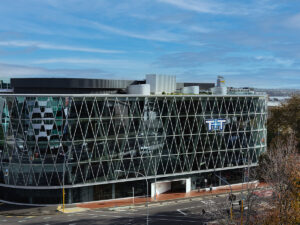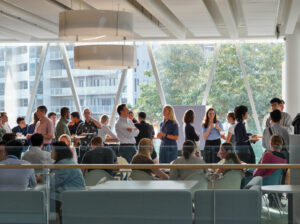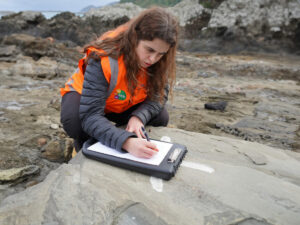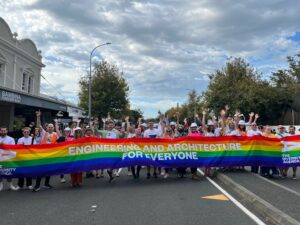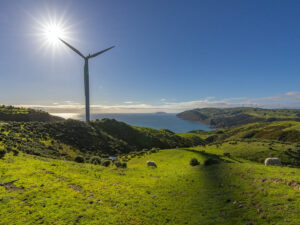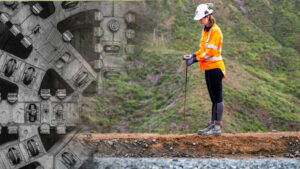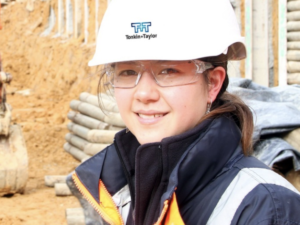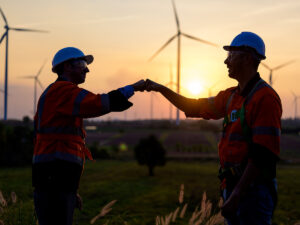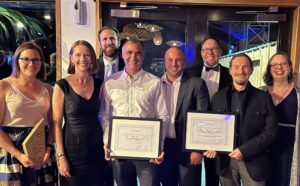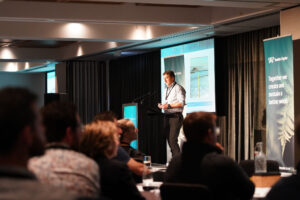
Hot off the heels of COP27, the largest international climate conference, we asked our Civil Engineer, Michelle Meaclem who participated in the conference to answer some of our top questions.
Michelle is an advocate for youth participation when it comes to climate action – she’s a member of the World Federation of Engineering Organisations Young Engineers/Future Leaders Working Group on Climate Action (WFEO YE/FL SDG13).
We asked Michelle to share her involvement at the conference, the important role youth have to play, and key insights from COP27.
1. What is COP27 for those who may not know – why is it important?
COP27, the 27th United Nations Framework Convention on Climate Change (UNFCCC) Conference of the Parties, is the conference of the 197 parties that ratified the UNFCCC in 1992 at the Earth Summit in Rio de Janeiro.
COP27 was held this year in Sharm El Sheikh, Egypt from 6 – 20 November. Heads of State or Governments, Government negotiators, and non-state actors (local authorities, businesses, and civil society) gathered together at the COP to discuss global climate action.
Leading up to the conference, COP27 president Sameh Shoukry stated that COP27 “must be remembered as the implementation COP”. COP27 was particularly important, especially after a report from the UNFCCC in October identified that the world is on track for approximately 2.5 degrees Celsius warming by 2100 based on the pledges made at the time from the Parties. At COP26, the Parties agreed to strengthen their climate action plans in 2022. As of 18 November 2022, 163 Parties have not updated their pledges.
2. What were your key takeaways/learnings from the conference?
COP27 did not achieve what was hoped in terms of keeping the world within the 1.5-degree limit, as agreed at Glasgow. Although this was a disappointing setback, there were still some positive outcomes from the formal negotiations, including never before reached agreements on ensuring technical assistance and agreement of funding arrangements for loss and damage.
Key learnings from the conference were:
- Collaboration is key to moving forward and accelerating effective climate action. We will not be able to achieve anything substantial when divided.
- There are still many barriers that young people and vulnerable and marginalised communities face, including systematic bias, being undervalued, and overlooked in terms of time and resources, and educational disparities (including language barriers, jargon, and understanding of processes).
- Non-state actors (communities, cities, businesses, etc) have a critical role in driving and creating momentum for climate action.
3. What has been your involvement in the conference?
I am part of both the World Federation of Engineers Young Engineers/Future Leaders Working Group on Climate Action (WFEO YE/FL SDG13) and the Commonwealth Youth for Sustainable Urbanisation Steering Committee.
For COP27, we organised events such as the UNFCCC official side event (Utilising the expertise of the youth to bridge the science-policy divide and improve access to finance), and various events across the Sustainable Development Goals Pavilion, Children & Youth Pavilion, and UNFCCC Capacity Building Hub. I had the opportunity to speak (virtually) at the event ‘Youth Participation in Sustainable Urbanisation’, conveying the barriers and best practices for the participation of young people in sustainable urbanisation.
We advocated for the meaningful inclusion of youth in bridging the science-policy divide for climate action, especially young science and engineering professionals. Our working group will be continuing to advocate for this post-COP through the development of a framework to bridge this divide.
4. What is the value of the participation of young people in COP27 conversations?
The climate conversation must be an intergenerational dialogue. The decisions made today will ultimately impact the future and it is important to meaningfully involve youth in COP27 and all climate conversations across local, national, and international policy-making.
Young people can be often overlooked due to the perception that they lack experience and knowledge. However, even just within the infrastructure sector, we know that young people are involved across all aspects of planning, advisory, design, construction, project management, financing, and advocacy. It is important to recognise that young people have fresh, up-to-date knowledge and hold roles as professionals, entrepreneurs, and innovators.
Equally so, young people need to not be recognised as a homogenous voice. Approximately half of the world’s population are under 30 and hold many different world views and backgrounds.
Youth participation in climate conversations (including at COP27) adds significant value through their drive for change, diverse perspectives, and innovation.
5. What’s next, what actions do we need to take before COP28?
Outside of the formal negotiations at COP27, we saw international pledges such as:
- The 28 priority actions of the Breakthrough Agenda (a coalition of 45 world leaders representing over 70% of the global GDP) to decarbonise the power, road transport, steel, hydrogen, and agriculture sectors in line with the goals of the Paris Agreement.
- The Forests and Climate Leaders’ Partnership (FCLP), building on more than 140 countries committing to halt and reverse forest loss and land degradation by 2030 in COP26.
- The Food and Agriculture for Sustainable Transformation Initiative (FAST)
For the first time, COP27 put a spotlight on the relationship between climate change and food systems.
COP27 also showcased the innovative and impactful action many groups are taking in their industries and communities.
COP28 isn’t too far away and although there will be important dialogues and negotiations at the conference, it is important for action to start today. We can take many measures, such as collaborating across the industry and actively working to achieve science-based targets while partnering with our most vulnerable communities.
At COP28, all eyes will be on the conclusion of the inaugural Global Stocktake (GST) – the first official stocktake of progress made towards Paris Agreement goals, assessing mitigation, adaptation, and means of implementation and support for action (such as finance). It will identify what is still required for Parties to meet their targets and opportunities to increase climate ambitions.
There is a lot of work ahead of us – in order to make the necessary changes to prevent a climate catastrophe – collaborative, inclusive, and intergenerational discussions will need to be at the heart of climate action.

